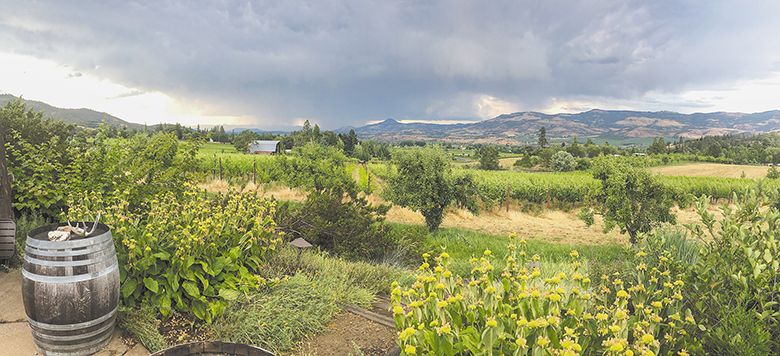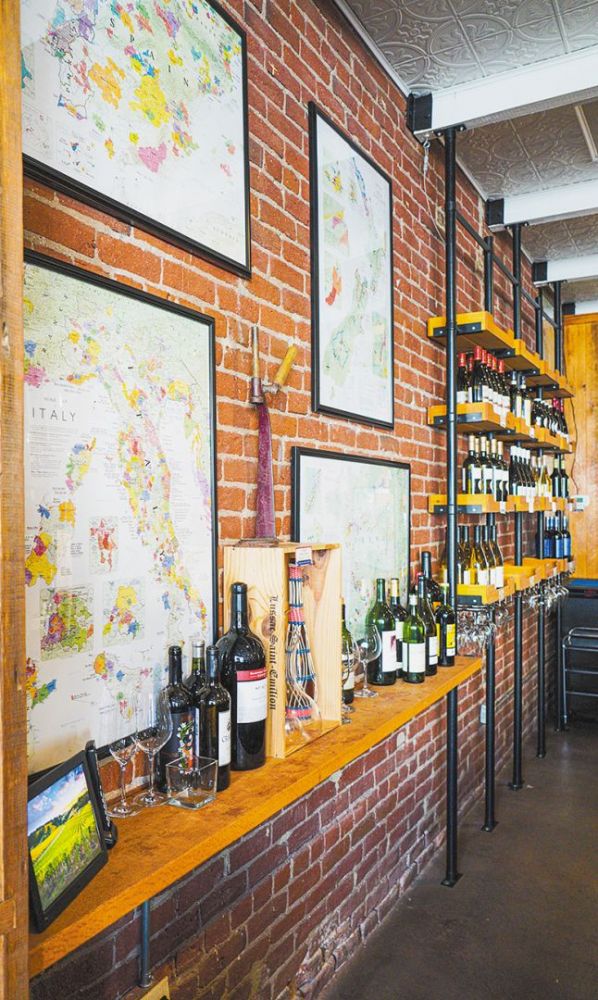New Meets Old: Part Two
Ancient winemaking techniques in the modern world


By Andrea Jacoby Oshell
What follows is part two in a series exploring ancient winemaking practices in the modern age. Part one was published in the June issue.
Forging an Ancient Path
Terry Sullivan’s Upper Five Vineyard became Southern Oregon’s first certified organic operation in 2005. But he didn’t stop there. Six years ago, his Talent vineyard, planted on the “upper five” acres of the historic Bagley pear orchard, was biodynamically certified by Demeter U.S.A.
Sullivan says, “In 2014, I spent time sampling my barrels and was drawn to those wines aged in older, neutral oak… it led me down a path of doing less in the winery.” He strives to showcase the attention paid to each grapevine. “Upper Five wines should reflect our land, terroir, climate… not the toast level of a barrel,” explains Sullivan.
To him, ancient winemaking means “less” in the winery. Sullivan says, “I use native yeast ferment, less technology in processing, no additions, no new oak, fermenting and aging in vessels like amphora, as well as fermenting the whole grape, skin contact and whole cluster.” However, less is hardly more. It requires closely tending each fermentation and using techniques including natural temperature control to slow them down or speed them up.
“Our grapes don’t need any help becoming great wine so we allow them to shine.” Sullivan has never wavered in his intention of leaving the Earth a better place. He says, “I hope some look at what I’m doing and decide it’s how they will make wine. But I’m sure it’s not for everybody.”
Wines to try:
Upper Five Vineyard 2023 Rosé of Grenache: bright, fresh and fully intentional, the fruit is picked early, for its racy acidity with notes of strawberry and cherry through the finish.
Upper Five Vineyard 2023 Pronto: enjoy this carbonic Grenache with bright red fruit flavors supported by grippy tannins.
Shop Ancient Wine Locally
Josh Kimball, owner of Kimball’s Artisan Wines in Jacksonville, has long promoted minimal intervention. He first started drinking wines crafted using past techniques while working for a Demeter-certified biodynamic winery. He recalls, “I traveled the country selling these wines to restaurants and wine shops focused exclusively on biodynamic bottlings. As I sampled more, I found these wines moved me– they were the most interesting, compelling… and alive.” His shop, opened in 2019, stocks the very wines he enjoys drinking.
He believes it’s important for everyone to have access to them, whether produced domestically or internationally. “We sell organic and biodynamic wines in a small town, providing access to residents who value artisanal products over mass-produced versions,” says Kimball. He is continually “on the hunt for wine with the fewest number of fingerprints possible.”
Kimball says, “I feel that we don’t talk enough about the native yeast, bacteria and microbes unique to where the wine is grown.” He finds fermentation crucial to the winemaking process and using ancient techniques is key. Kimball states, “We need to preserve those precious commodities– coaxing them out of the wine to produce something truly unique to where and when it comes from.”
Kimball’s recommendations:
Cameron Winery
Hiyu Farms
Golden Cluster
Faith Lemire-Baeten leaped headfirst into wine in 2019 after moving to Oregon and managing a local tasting room. Two years ago, she opened Partake Shop, Lounge & Dine in downtown Grants Pass. She feels a commitment to curate an excellent selection of wines from around the globe. Customers can explore new regions monthly by joining Partake’s wine club.
Lemire-Baeten says, “In managing an international wine shop, I would be remiss not including wines made in the ancient style.” In March, Partake’s wine club members traversed more deeply into the birthplace of wine. “We explored the region of Lebanon. Most people were shocked to learn the country even made wine, let alone is considered the oldest winemaking region of the world,” recalls Lemire-Baeten. She fondly remembers conversations with members about the country’s storied history and impact on modern-day winemaking. She says, “Wine with a story always tastes better.”
Lemire-Baeten feels excited by the new direction of the wine industry. “Along with the trends toward natural wine, we are slowly rediscovering its roots,” she says. Stressing how ancient winemaking techniques can translate to understanding wine as a whole. “Talking about old methods helps provide important context to sustainable farming and low intervention winemaking as well. These techniques weren’t used back then because they were trendy, but because they were the only way.”
Lemire-Baeten’s recommendations:
Illahe Vineyards
Brooks Wine
Ricochet Wine Company
An Enduring Trend
During ancient times, wine was a necessity, a method of purifying water, and frequently used as medicine. Today, ancient approaches may be one of the hottest trends, with permanent benefits. By learning wine’s lengthy history, the natural benefits from native fermentations as well as adopting ancient winemaking and farming techniques, the list of positive dividends is extensive. Mindful consumption can lead to an overall change in the wine industry.
Andrea Jacoby OShell has been in the wine industry for over a decade first discovering her love of wine at a small neighborhood wine shop in Miamisburg, Ohio. She also discovered her love of writing during that time by writing and publishing background guides for the International Model United Nations Organization. She moved to Oregon in 2015 where her wine journey continued. She resides in southern Oregon and currently works for a small wine distributor. She also achieved her WSET level III with merit in 2021. In her spare time, you can usually find her meandering through old East Medford with her two dogs, Teddy and Luna.









